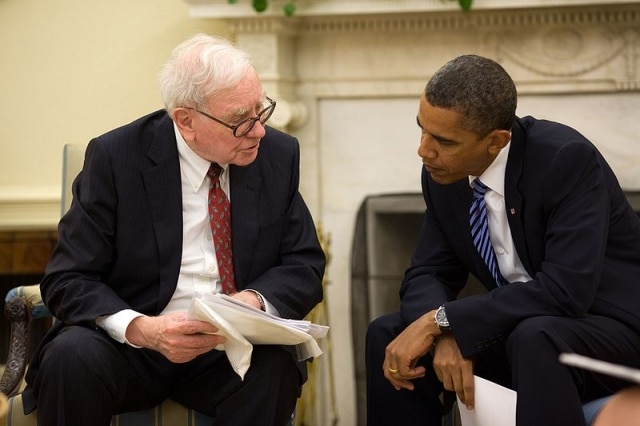Warren Buffett – the fourth richest man on the planet and major campaign contributor to President Barack Obama in 2008 and 2012 – may soon get a whole lot richer.
That’s because he just bought over half a billion bucks worth of Suncor Energy stock: $524 million in the second quarter of 2013, to be precise, according to Securities and Exchange Commission filings. Suncor is a major producer and marketer of tar sands via its wholly owned subsidiary Petro-Canada (formerly Sunoco) and this latest development follows a trend of Buffett enriching himself through dirty investments and deal-making.
So far in 2013, Suncor (formerly Sun Oil Company) has produced 328,000 barrels per day of tar sands crude.
Though he receives far less negative press than the Koch Brothers, Buffett’s no deep green ecologist. Not in the slightest.
Referred to as one of 17 “Climate Killers” by Rolling Stone‘s Tim Dickinson in a January 2010 story, Buffett owns the behemoth holding company, Berkshire Hathway. It’s through Berkshire that he’s making a killing – while simultaneously killing the ecosystem – through one of its most profitable wholly-owned assets: Burlington Northern Santa Fe (BNSF).
Buffett purchased BNSF for $26 billion and was “the largest acquisition of Buffett’s storied career,” Dickinson wrote.
BNSF hauls around frac sand for the controversial horizontal oil and gas drilling process known as “fracking.” The rail company also moves fracked oil from North Dakota’s Bakken Shale basin, tar sands logistical equipment and tar sands crude itself and tons of coal. And not only does Buffett’s BNSF haul around ungodly amounts of coal, he actually owns coal-burning utility companies, too.
“BNSF is the nation’s top hauler of coal, shipping some 300 million tons a year. That’s enough to light up 10 percent of the nation’s homes — many of which are powered by another Berkshire subsidiary, MidAmerican Energy,” Dickinson explained.
Beyond MidAmerican Energy, Buffett also owns the coal-burning PacifiCorp and his BNSF freight trains are largely responsible for the coal export boom unfolding in the northwest corridor of the United States.
“PacifiCorp…owns the most coal plants in the West and recently unveiled a long-term energy plan that did not include a single wind project over the next ten years,” explained a recent blog post written by the Sierra Club. “And Warren Buffett is still involved with one of the biggest coal-burning schemes of all – ongoing plans to export coal…to…Asia.”
“Buffett’s BNSF Railway would be the primary transporter of that coal, and the company has tried to get the coal export terminals approved over the objections of thousands of activists across the Pacific Northwest.”
And as his slam dunk, Buffett also has plans to convert BNSF‘s freight trains to utilize fracked shale gas. He then plans to use those same shale gas-powered trains to transport fracked shale oil from North Dakota (5-percent of BNSF‘s total shipments and 190,000 cars/week), a win-win for Buffett and a lose-lose for the ecosystem and the climate.
“We have a couple locomotives we’re experimenting with this year on it. The railroads are definitely experimenting with converting to natural gas,” he told CNBC‘s Jim Cramer in a March 2013 interview. “[Y]ou’ve got to look at converting any kind of an engine to natural gas.”
‘Tis quite the list of “dirty deeds” by the man coined the “Oracle of Omaha.” And relative to his uber-wealth – to cue up the AC/DC – they’re “done dirt cheap.”
Photo Credit: Wikimedia Commons
Subscribe to our newsletter
Stay up to date with DeSmog news and alerts






